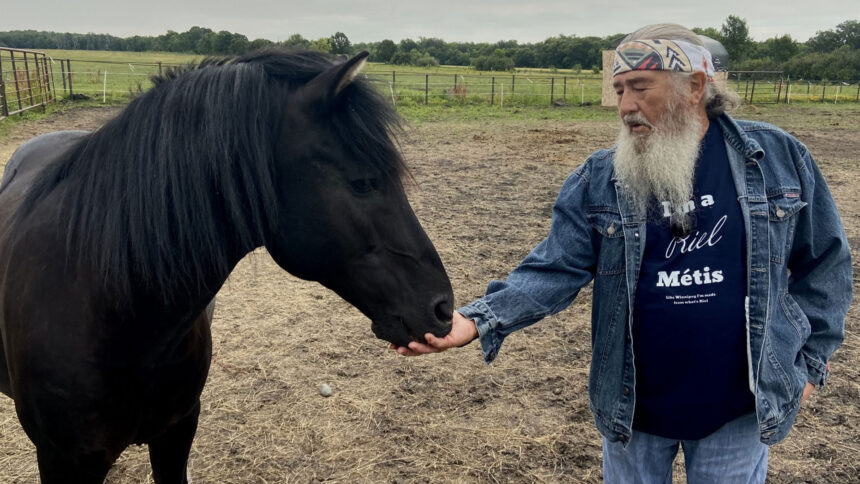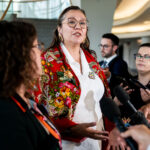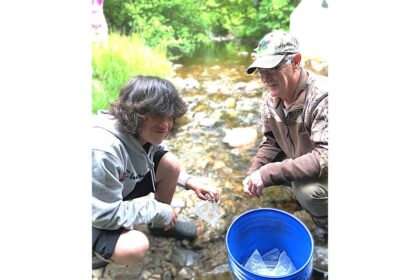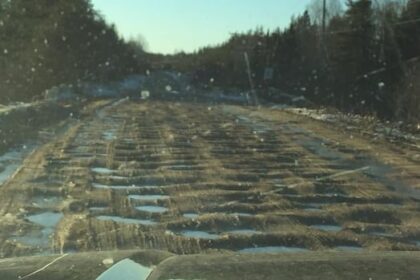For the past four years, Ron Breland and his wife Gwen have been turning people’s trash into treasured support for animals. “I put up an ad on Facebook, or ads on Facebook, asking for recyclable metal, junk, used items, items that people don’t want anymore,” Breland told APTN News. “Once a week, we go pick up the stuff up and then we go to two scrap yards.” Through their initiative, Recycling 4 Animals, Breland donates proceeds received from old barbecues, bicycles and appliances to animals in need. On Wednesday afternoon, Breland arrived at Sagehill Stables in Winnipeg to visit one of their beneficiaries: an Ojibwe Spirit Horse named Chase. “We’ve been supporting Chase for about a year and a half now, and we’re platinum sponsors, as high as you can go,” he said. “We’re very happy about that.” The animal-loving couple began their venture by supporting the Beagle Alliance–an organization that saves former research animals from being euthanized. They later heard about Sagehill Stables’ Ojibwe Spirit Horses through social media and decided to expand their efforts. “Being an Aboriginal horse, and I’m Métis, it just fit,” he said. “They were supposed to be going extinct. Now, I think they’re coming back. So, it was the perfect rescue for us to do this.” From extinction to expansion The Ojibwe Spirit Horse, also known as the Lac la Croix Indigenous Pony, is believed to be the only surviving horse breed developed by Indigenous peoples in Canada. Thousands lived in the wild and among Indigenous communities in Ontario–but they were killed by settlers, who thought they were a nuisance. In 1977, five men from the Bois Forte Reservation in Minnesota and the Lac La Croix First Nation in Ontario rescued four remaining mares and bred them. Volunteer caretaker, Michelle McConomy, is among those helping Ojibwe Spirit Horses thrive today. “Chase here came to Sagehill Stables about two years ago in hopes of breeding him with some local Ojibwe Spirit Horse mares in Manitoba,” McConomy said. “They’re an endangered breed. There are less than 200 in Canada.” As McConomy attests, Chase is “not your typical stallion”. “He’s so gentle, he loves children, he’s very curious,” she said. Spirited sponsors Gwen Donohoe, the owner of Sagehill Stables, said sponsors like Recycling 4 Animals make hosting Chase possible. “To keep him and take care of him, it all costs a lot, and having a stallion, we can’t really use him in our lesson program to bring in income to pay for it,” Donohoe said. “So, sponsors are the only way we can keep having him here.” Support from sponsors has also allowed them to take in three Ojibwe mares. “We call them the three sisters,” McConomy said. “They’re named after the three sisters garden, so corn, beans and squash.” Since acquiring the trio, the horses have become a fixture in their community programming, including life skills workshops, Indigenous men’s and women’s circles and local powwows. “Using Ojibwe Spirit Horses to teach Indigenous youth and adults these life skills programs has been really special,” Donohoe said. “We’ve had lots of great feedback from the students saying how special it was that they felt to have an Ojibwe Spirit Horse, and they were also Indigenous.” A stable support By next year, Recycling 4 Animals may have more mouths to feed. The stable is hopeful that two of the three sisters will give birth to healthy foals. Breland said people can support the cause through their smartphones. “We have a YouTube channel. It’s called Recycling 4 Animals,” Breland said. “If we would get a thousand views, a thousand subscriptions and a thousand views per month, YouTube would pay us, and I would donate that money right back.” Continue Reading
Red River Métis man on mission to save Ojibwe Spirit Horses through scrap metal

Leave a Comment










